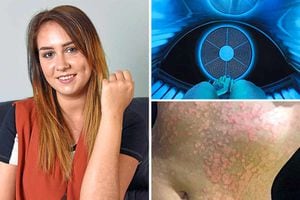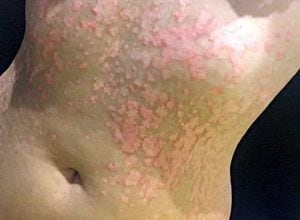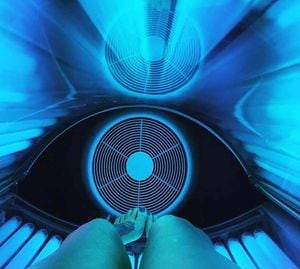Sunbed addict Chloe takes to tanning to stop her skin from shedding like a snake
A woman has become a sunbed addict after an agonising condition caused her skin to shed like a snake.

Since the age of 13, Chloe Muir, 20, of Mount Road, Lanesfield, Wolverhampton has been plagued with itchy and irritable skin after developing psoriasis.

Chloe was on holiday in Cyprus when a cat scratch caused a break in her skin, it triggered her body to become covered in painful snakelike scales.
In a desperate bid to treat the condition, the graphic communications student has turned to tanning after all other treatment failed.
Chloe, who uses sunbeds for up to an hour a week, now has visibly clearer skin and no longer has to vacuum her skin off her bedroom floor every day.
Chloe said: "I've been living in constant pain for seven years, at some points it's been unbearable.
"The red itchy patches of skin are all over my body, it's horrible.
"My skin literally sheds like a snake, it's constantly flaking off meaning I have to vacuum my bedroom most days as it's absolutely covered.
"I've tried so many different forms of treatment over the years, steroids, injections, creams, but nothings really worked.
"The only thing that helped was intense UV light treatment at hospital but unfortunately it caused my skin to burn really badly so I had to stop.
"That's when I started using regular sunbeds as the UV lights in them aren't so intense and I couldn't believe the results.
"I use the sunbeds for 12 minutes up to four times a week sometimes now.
"My skin instantly feels better afterwards, I itch less, the redness goes down and the pain is tolerable."

Chloe, who suffers from three forms of psoriasis, gutate, plaque and scalp, visits her dermatologist regularly due to the dangers of using sunbeds.
The Plymouth University student is in a catch-22 though as without UV light her skin is permanently irritable, painful and sore.
Chloe said: "It's definitely a catch-22 for me, I know how bad sunbeds are for your skin, so it's ironic that it's the only thing that helps me.
"I know they're bad for you and I wish I didn't have to use them, but it's horrible living in discomfort every day.
"I visit my dermatologist though and get my skin checked regularly, it's literally been a last resort for me.
"I also try to avoid sunbeds in winter and just use my clothes to cover up my skin but it's hard in the summer when it's so hot and I want to wear dresses or shorts.
"My advice to other psoriasis suffers is to exhaust all other avenues."

Chloe is finally feeling more confident in her own skin this summer after enduring years of staring from strangers.
Chloe said: "When my skin flares up people constantly stare at me like I'm contagious or something.
"I remember accepting an award at college before and someone asking me if I had chickenpox.
"I've even had to dye my hair blonde before as people think I have bad dandruff but it's my skin.
"It's not very nice, but people just don't always understand psoriasis I guess.
"I finally feel like I can walk around with confidence and a few weeks ago I actually wore a dress to a wedding."
Professor Chris Griffiths from the University of Manchester and British Skin Foundation spokesperson said: "Psoriasis tends to come and go unpredictably and can appear at any age.
"Most cases (75 per cent) occur before the age of 35 with average age of onset around 20, slightly earlier in females.
"Psoriasis doesn't scar the skin and appears as pink or red coloured areas on the skin with silvery-white scales, known as plaques.
"Plaques of psoriasis usually appear on the knees, elbows, trunk and scalp but are not exclusive to these areas.
"Flare ups can happen from a combination of genetic susceptibility and environmental triggers such as streptococcal tonsillitis or pharyngitis, stress, alcohol and some medicines.
"Treatment depends on the extent of the disease and varies from topical creams and ointments through to light (UVB) therapy, systemic medicines such as methotrexate to the new biologic injectable drugs which are highly effective for severe cases."





